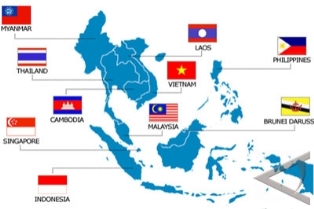
Five years since the Asean Intergovernmental Human Rights Commission (AICHR) was formed, purportedly as a huge step forward in addressing human rights violations in the region, it appears that its raison d’être has been all but forgotten.
Civil societies from across the 10 South East Asian countries in the recent Asean Civil Society Conference (also known as the Asean People’s Forum) tore the commission into shreds, calling it essentially ‘castrated’ by its weak secretariat, ineffective terms of reference (TOR) and deafening silence on some of the most severe human rights violations in recent times.
The AICHR, which is the human rights body formed within the Asean member states, is for the “promotion and protection of human rights and fundamental freedoms of the peoples of Asean”. It was first established in 2009.
The AICHR’s weaknesses were thrown into stark relief in a report by the Asian Forum for Human Rights and Development (Forum-Asia), titled “Four years on and still treading water: a report on the performance of Asean human rights mechanisms in 2013”.
In the report, civil societies stated that the most disappointing record of the AICHR is its total silence on key violations in the region, such as the disappearance of prominent Laotian activist Sombath Somphone, who was abducted on Dec 15, 2012. The Laotian government had denied involvement in his disappearance, despite international pressure for open and transparent investigation in the matter. “AICHR did not issue any public response to urgent calls from CSOs and Asean dialogue partners to highlight his disappearance,” the report stated.
The commission also stayed its tongue when urged by the Makassar Legal Aid Institute to issue a call to the Indonesian government last year over the violent religious prosecution of the minority Islamic Ahmadiyya community in South Sulawesi, the report criticised.

More recently, the AICHR did not issue any statement over the string of arrests and interrogations of Malaysians under the Sedition Act, although international human rights bodies, including four rapporteurs from the UN Human Rights Council, had criticised the use of the colonial-era Act.
AICHR has also not issued any public statement regarding the sluggish investigation by the Philippines government into the deadly Ampatuan massacre in 2009, where 57 people – including 31 journalists – were murdered and their bodies dumped in shallow graves, in what is believed to be a politically-motivated hit. Till today, no one has been charged or held responsible for the murders.
During a press conference for the launch of the report here in Petaling Jaya last week, representatives of civil societies appeared angered by a seemingly uncaring human rights body. International Federation for Human Rights secretary-general and permanent delegate to the Asean Debbie Stothard (pic) said the lack of an independent secretariat and weak terms of reference had essentially “castrated” the AICHR. “The AICHR is basically a global laughingstock,” she said.
AICHR currently does not operate an independent secretariat but is supported by the Asean Secretariat, more specifically by the director-general of the political security community of Asean and its team. Civil societies blame the veil of “non-interference” and “sovereignty” among member states which has led to the ineffectiveness of this body. Stothard said that while non-interference was accepted across all regional intergovernmental organisations, the purpose of it was military in nature.
“Non-interference is to ensure that nations do not set up missiles in each others’ lands. It was not meant to deflect the responsibility of member states to protect the integrity of human rights,” she said. She questioned the double standard when it came to using the term “non-interference”. “When it is interference for the sake of economic benefit, it is fine; but not for human rights violations – why the double standard?” she added.
Executive director of Suaram Yap Swee Seng said the representatives of member states to the AICHR remained problematic, especially Malaysia’s representative. The Malaysian representative to the AICHR is Umno lawyer Tan Sri Shafee Abdullah – a choice which was met with resistance by civil society organisations (CSOs) here because his appointment was not transparent and was done without consulting CSOs.
“AICHR is probably the worst human rights commission I have ever come across, with no mandate and no power to investigate human rights violations,” he said. Yap added that any nation which had failed to protect its people could not legitimately claim non-interference.
“Non-interference or otherwise, legitimacy of this argument goes out the window because other nations feel the effects of these human rights violations. “When the Burmese government failed to protect the Rohingya community from religious prosecution, thousands fled to seek asylum in Malaysia – so how can we say we cannot interfere?” he said.
Malaysia is, after 10 years, coming full circle from the time it established the Asean People’s Forum in 2005 when it last chaired the Asean. A decade later, how much claim can Malaysia stake on its contributions to protecting human rights across the region? How much credit can our government take for any sort of progress made, as a region, towards a vibrant democracy? The answer could be none at all, unless Malaysia takes it upon itself, as chair of Asean next year, to transform the AICHR.
Penulis: Pauline Wong
Sumber berita: theheatonline.asia
